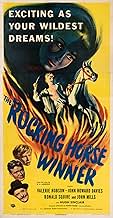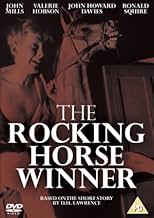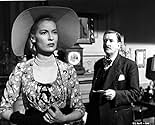IMDb RATING
7.2/10
1.5K
YOUR RATING
A young boy receives a rocking horse for Christmas and soon learns that he is able to pick the winning horse at the races.A young boy receives a rocking horse for Christmas and soon learns that he is able to pick the winning horse at the races.A young boy receives a rocking horse for Christmas and soon learns that he is able to pick the winning horse at the races.
- Director
- Writers
- Stars
Anthony Holles
- Bowler Hat
- (uncredited)
Melanie Mackenzie
- Matilda Grahame
- (uncredited)
Michael Ripper
- 2nd Chauffeur
- (uncredited)
Johnnie Schofield
- 1st Chauffeur
- (uncredited)
Caroline Steer
- Joan Grahame
- (uncredited)
- Director
- Writers
- All cast & crew
- Production, box office & more at IMDbPro
Featured reviews
Suspenseful, intriguing, disturbing, heartbreaking, atmospherically crafted by director and photographer, this is a gem of a movie that was too out of the rut to be appreciated by audiences in its day. The characters are not only totally believable but so convincingly acted that few viewers will have any difficulty accepting the plot's key supernatural premise. Because they are so credibly realistic, however, some of the people in this movie (the lad's mother and father, for instance) are far from sympathetic. This trait doubtless alienated contemporary audiences even further, particularly those looking for escape into an idealistic world of smilingly duty-bound, hardworking mothers and bumbling yet well-intentioned dads.
As stated, all the players are excellentincluding producer John Mills who cast himself in a small but key rolebut three are so outstanding it would churlish not to mention them individually: Valerie Hobson is perfect as the selfish, socially aspiring mum; John Howard Davies is likewise brilliant as the driven, psychotic boy of the title; and it's great to see Ronald Squire utilizing his talents to the full in a major role.
The pace never slackens and the movie incorporates so many unforgettably powerful scenes, it would be impossible to single just three or four for special praise.
In short: a masterpiece from screenwriter/director Anthony Pelissier (who handled only a handful of movies), photographer Desmond Dickinson and a fine array of artists and craftspeople under the control of actor/producer John Mills.
As stated, all the players are excellentincluding producer John Mills who cast himself in a small but key rolebut three are so outstanding it would churlish not to mention them individually: Valerie Hobson is perfect as the selfish, socially aspiring mum; John Howard Davies is likewise brilliant as the driven, psychotic boy of the title; and it's great to see Ronald Squire utilizing his talents to the full in a major role.
The pace never slackens and the movie incorporates so many unforgettably powerful scenes, it would be impossible to single just three or four for special praise.
In short: a masterpiece from screenwriter/director Anthony Pelissier (who handled only a handful of movies), photographer Desmond Dickinson and a fine array of artists and craftspeople under the control of actor/producer John Mills.
This particular D.H. Lawrence story has been done three additional times since this version came out in 1950. They would have to go some to compete with this film for drama and suspense.
I had never seen this film before tonight and the title is so incredibly deceptive. I expected a charming children's fantasy, but got something quite a bit different. One thing I would never do is allow small kids to see The Rocking Horse Winner. They will have nightmare's for years and will NEVER want to get on a rocking horse if you have one.
Hugh Sinclair and Valerie Hobson play a pair of post World War II self indulgent parents who are living way beyond their means, like a lot of folks are today on both sides of the pond. He gambles and she spends money on luxury items like there's no tomorrow. Her brother Ronald Squire bails her out a lot, but he's having no more of it.
All this is having an effect on the United Kingdom's best known child star of the time John Howard Davies. He's the oldest of the three kids and a withdrawn, but sensitive kid who knows there's something wrong.
Davies makes friends with the new handyman John Mills who is a wounded war veteran and before the war used to work as jockey in his youth. When Davies gets among other things a rocking horse for Christmas, Mills shows him how to ride ace-deuce, jockey style. Davies becomes obsessed with the horse and after a while he starts imagining the horse telling him about winning tips at the local track. When he's "really sure" these ponies have a habit of coming in.
Given these plot premises it sounds like you're setting up a comedy, but actually what we get is tragedy here, a stark a bitter tragedy.
Anthony Pellisier wrote and directed and John Mills produced this film for J. Arthur Rank. Pellisier used some unique and terrifying camera angles and makes the rocking horse an incredibly sinister figure. And he doesn't do too bad with his human players either.
The Rocking Horse Winner after almost 60 years still holds up well as one of the most sinister films I've ever seen. Don't be fooled by the title, definitely NOT one to have the kids view.
I had never seen this film before tonight and the title is so incredibly deceptive. I expected a charming children's fantasy, but got something quite a bit different. One thing I would never do is allow small kids to see The Rocking Horse Winner. They will have nightmare's for years and will NEVER want to get on a rocking horse if you have one.
Hugh Sinclair and Valerie Hobson play a pair of post World War II self indulgent parents who are living way beyond their means, like a lot of folks are today on both sides of the pond. He gambles and she spends money on luxury items like there's no tomorrow. Her brother Ronald Squire bails her out a lot, but he's having no more of it.
All this is having an effect on the United Kingdom's best known child star of the time John Howard Davies. He's the oldest of the three kids and a withdrawn, but sensitive kid who knows there's something wrong.
Davies makes friends with the new handyman John Mills who is a wounded war veteran and before the war used to work as jockey in his youth. When Davies gets among other things a rocking horse for Christmas, Mills shows him how to ride ace-deuce, jockey style. Davies becomes obsessed with the horse and after a while he starts imagining the horse telling him about winning tips at the local track. When he's "really sure" these ponies have a habit of coming in.
Given these plot premises it sounds like you're setting up a comedy, but actually what we get is tragedy here, a stark a bitter tragedy.
Anthony Pellisier wrote and directed and John Mills produced this film for J. Arthur Rank. Pellisier used some unique and terrifying camera angles and makes the rocking horse an incredibly sinister figure. And he doesn't do too bad with his human players either.
The Rocking Horse Winner after almost 60 years still holds up well as one of the most sinister films I've ever seen. Don't be fooled by the title, definitely NOT one to have the kids view.
One day, a fine young lad, played by John Howard Davies, gets a wooden rocking horse for a Christmas gift by his favorite uncle, a rich uncle. His father is a butterfingers with money, as he bets and loses it, while his wife, played by Valerie Hobson, is constantly at him, saying they need more money, we simply must have it. She, by the way, is used to having her way and used to living beyond their means. The uncle is her brother who has gotten them out of more than one financial scrape, who now refuses to do it anymore. He's done. The boy discovers by getting on the horse and rocking, that the horse not only talks to him, but gives him tips on the winners at the horse track. By way of betting through the groundskeeper, played by John Mills, the young boy amasses gads of money. And yet, what starts as a fantasy and a somewhat whimsical little film takes a dramatic and scary turn. This film has a little bit of everything for everyone: fantasy, humor, drama, and even a bit of the Gothic touch. The lesson to be learned from this film is simple: do not argue, or discuss money issues, in front of your children. One feels that maybe writer D. H. Lawrence, who wrote the short story from which this was based, may have lived a similar type of childhood but to a degree obviously. If it's draining for an adult, how do you think it makes children feel? This climax is made for a point for all adults - to learn from and change. A very dramatic and memorable film is "The Rocking Horse Winner." All the actors were exceptional, including the young lad, but the real star of the story is author D. H. Lawrence's imagination that tries to teach people the only way he can.
The dialogue is expectedly very British and good. Though a perfunctory performance was all the needlessly limited role of the father required, all other players did wonderfully.
Interestingly, the story concerns a good, but sybaritic mother's avarice and her loving son's obsessive desire to satisfy it. It also plays into the idea of money as an inherent evil while earning my high praise by not taking this too far. It is also another one of many films I have enjoyed on the fascinating subject of gambling.
Interestingly, the story concerns a good, but sybaritic mother's avarice and her loving son's obsessive desire to satisfy it. It also plays into the idea of money as an inherent evil while earning my high praise by not taking this too far. It is also another one of many films I have enjoyed on the fascinating subject of gambling.
I've seen a few rocking horses in my time, but none that looked like this one. With its predatory teeth, gaping mouth, and flaring eyes, it looks more like Halloween than X-mas. No wonder it's got supposedly demonic powers. But then the social-climbing parents need help of the monetary kind. Mom (Hobson) isn't happy with just a big house and servants. She wants top status among the British upper-class, and by golly she'll spend whatever it takes, affordable or not. Meanwhile, Dad (Sinclair) tries to keep up by losing at gambling, while Uncle Oscar (Squire) is finally fed up with doling out money from the family trust. That leaves the kids (Davies, et.al.) to make out as best they can with neglectful parents. So where will the money come from, and how will the kids connect with Mom. Enter an infernal toy.
I can see the premise being done on the Twilight Zone, but certainly not to better effect. With his rather narrow eyes, little Paul (Davies) is positively scary when demonically whipping both himself and the wooden horse into a sweaty frenzy. A thousand gory films could not register more strongly than these inspired scenes. It's a unnerving spectre that moves the entire film into a special category of its own.
Surprisingly, the suspense of the rocking horse is not built up in the movie's main part. Instead, the film's majority deals with more ordinary matters: placing bets, pawning dresses, Uncle Oscar, Bassett (Mills) and Paul. Thus a natural contrast is laid for the demonic scenes. Nonetheless, the acting is first-rate, though Sinclair pretty much fades into the background as Dad, while Hobson's mom takes center stage in sleekly determined fashion. Then again, Mills is especially winning as the humane handy man. Happily, he furnishes needed companionship for the lonely boy. And, given the parent's upper-class pretensions, I detect a comment on the effects of Britain's traditional class system.
To me, however, it's never clear whether the whispering comes from the house or from Paul's internalizing of the family's money troubles. But, either way, the never-ending need for picking race-horse winners drives poor Paul into continuing his rocking horse frenzy. The tragedy lies in the personal toll this takes on him for the sake of his generally oblivious mother. Still, it is possible, unless I missed something, that Paul is just lucky picking winners rather than rocking horse possessed. After all, he wants to think he's lucky and maybe he is. In that case, no supernatural would be involved. Instead the upshot would be how an imaginative boy internalizes overriding family greed. In that case, I think the ending would be even more tragic. I may be mistaken, but I don't think the screenplay forecloses this second possibility. Either way, however, those final scenes are genuinely memorable.
Speaking of endings, it's certainly not one Hollywood's Motion Picture Code would have permitted. Good for the British. Because what we're left with is a truly remarkable one-of-a- kind, whose moral is as timely now as 6 decades ago. Don't miss it.
I can see the premise being done on the Twilight Zone, but certainly not to better effect. With his rather narrow eyes, little Paul (Davies) is positively scary when demonically whipping both himself and the wooden horse into a sweaty frenzy. A thousand gory films could not register more strongly than these inspired scenes. It's a unnerving spectre that moves the entire film into a special category of its own.
Surprisingly, the suspense of the rocking horse is not built up in the movie's main part. Instead, the film's majority deals with more ordinary matters: placing bets, pawning dresses, Uncle Oscar, Bassett (Mills) and Paul. Thus a natural contrast is laid for the demonic scenes. Nonetheless, the acting is first-rate, though Sinclair pretty much fades into the background as Dad, while Hobson's mom takes center stage in sleekly determined fashion. Then again, Mills is especially winning as the humane handy man. Happily, he furnishes needed companionship for the lonely boy. And, given the parent's upper-class pretensions, I detect a comment on the effects of Britain's traditional class system.
To me, however, it's never clear whether the whispering comes from the house or from Paul's internalizing of the family's money troubles. But, either way, the never-ending need for picking race-horse winners drives poor Paul into continuing his rocking horse frenzy. The tragedy lies in the personal toll this takes on him for the sake of his generally oblivious mother. Still, it is possible, unless I missed something, that Paul is just lucky picking winners rather than rocking horse possessed. After all, he wants to think he's lucky and maybe he is. In that case, no supernatural would be involved. Instead the upshot would be how an imaginative boy internalizes overriding family greed. In that case, I think the ending would be even more tragic. I may be mistaken, but I don't think the screenplay forecloses this second possibility. Either way, however, those final scenes are genuinely memorable.
Speaking of endings, it's certainly not one Hollywood's Motion Picture Code would have permitted. Good for the British. Because what we're left with is a truly remarkable one-of-a- kind, whose moral is as timely now as 6 decades ago. Don't miss it.
Did you know
- TriviaBassett says that he had "... fine plans for teaching Gordon Richards a thing or two...". Gordon Richards (1904 - 1986) was an English jockey. He was the Champion Jockey in British flat horse-racing 26 times, a record that still stands.
- Quotes
[last lines]
Hester Grahame: I wanted to see the end of it, just wanted to be sure it had gone. Gone for good.
Bassett: You won't never see the end of it, ma'am, nor will I. As long as ever we'll live, we'll remember, and we'll know just what it is was done.
- ConnectionsVersion of Winner (1977)
- SoundtracksSilent Night
(uncredited)
Music by Franz Xaver Gruber
English lyrics by John Freeman Young
Sung by the carollers
Details
- Release date
- Country of origin
- Language
- Also known as
- Dobitnik sa drvenog konjića
- Filming locations
- Denham Studios, Denham, Buckinghamshire, England, UK(studio: made at Denham Studios, London, England)
- Production companies
- See more company credits at IMDbPro
- Runtime1 hour 31 minutes
- Color
- Aspect ratio
- 1.37 : 1
Contribute to this page
Suggest an edit or add missing content

Top Gap
By what name was The Rocking Horse Winner (1949) officially released in India in English?
Answer


























